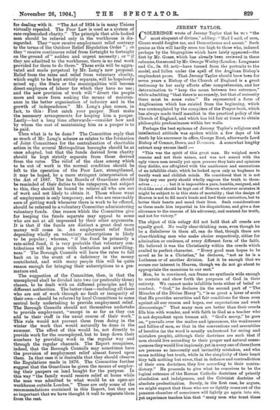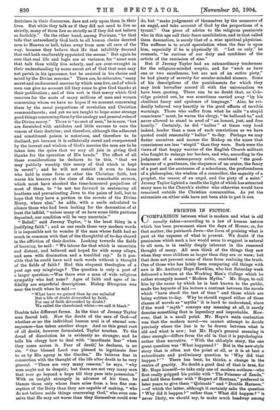Perhaps the best epitome of Jeremy Taylor's religious and intellectual
attitude was spoken within a few days of his death by his successor in office, George Rust, afterwards Lord Bishop of Connor, Down, and Dromore. A somewhat lengthy extract may excuse itself :—
"This was the spirit of this great man. He weighed men's reasons and not their names, and was not scared with the ugly visors men usually put upon persons they hate and opinions they dislike, nor affrighted with the anathemas and execrations of an infallible chair, which he looked upon only as bugbears to terrify weak and childish minds. He considered that it is not likely any one party should wholly engross the truth to them- selves but it is impossible a pure, humble, resigned, and God-like soul should be kept out of Heaven whatever mistakes it might be subject to in this state of mortality ; that the design of Heaven is not to fill men's heads and feed their curiosities, but to better their hearts and mend their lives. Such considerations as these made him impartial in his disquisitions, and give a due allowance to the reasons of his adversary, and contend for truth, and not for victory."
The object of this eulogy did not hold that all creeds are equally good. No really clear-thinking man, even though he be a disbeliever in them all, can do that, though there are clear-thinking men who make choice respectively, either for admiration or credence, of every different form of the faith. He believed it was the Christianity within the creeds which availed to perfect character. " Every good man hopes to be saved as he is a Christian," he declares, "not as he is a Lutheran or of another division. Let it be enough that we secure our interest in Heaven, though we do not go about to appropriate the mansions to our sect."
Man, be is convinced, can frame no synthesis wide enough to contain and show forth the purposes of God in their entirety. We cannot make infallible tests either of belief or conduct. " God," he declares (in the second part of " The Miracles of the Divine Mercy "), " is so great a lover of souls that He provides securities and fair conditions for them even against all our reason and hopes, our expectations and weak discoursings." That many men are better than their creeds fills him with wonder, and with faith in God as a teacher who is not dependent upon human aid. " God's mercy," he goes on, " prevails over the malice and ignorances, the weaknesses and follies of men, so that in. the conventions and assemblies of heretics (as the word is usually understood for erring and mistaken people), although their doctrines are such that if men should live according to their proper and natural conse- quences they would live impiously, yet in every one of these there are persons so innocently and invincibly mistaken, and who mean nothing but truth, while in the simplicity of their heart they talk nothing but error, that in defiance and contradiction of their own doctrines, they live according to their contra- dictory." He proceeds to give what he conceives to be the logical outcome of the Roman Catholic doctrines of priestly absolution and indulgences, and the Calvinist doctrine of absolute predestination. Surely, in the first case, he argues, we might expect that those who are so lightly come out of the penance chamber of conscience will lightly go again into sin, yet experience teaches him that " many men who trust these strictly, many of them live so strictly as if they did not believe so foolishly." On the other band, among Puritans, "he that tells that antecedently God bath to all human choice decreed men to Heaven or hell, takes away from men all care of the way, because they believe that He that infallibly decreed that end bath unalterably appointed the means." But again he sees that real life and logic are at variance, for " some men that talk thus wildly live soberly, and are over-wrought in their understanding by some secret art of God that man may not perish in his ignorance, but be assisted in his choice and saved by the Divine mercies." There are, he reiterates, " many secret and undiscerned mercies by which men live, and of which men can give no account till they come to give God thanks at their publication ; and of this sort is that mercy which God reserves for the souls of many millions of men and women concerning whom we have no hopes if we account concerning them by the usual proportions of revelation and Christian commandments; and yet we are taught to hope some strange good things concerning them by the analogy and general rules of the Divine mercy." There is "no sect of men," he is sure, but are furnished with antidotes and little excuses to cure the venom of their doctrine ; and therefore, although the adherent and constituent poison is notorious, and therefore to be declined, yet because it is collaterally cured and overpowered by the torrent and wisdom of God's mercies the men are to be taken into the quire that we may all join in giving God thanks for the operation of His bands." The effect of all these considerations he declares to be this, " that we may publicly worship this mercy of God which is kept in secret"; and he will not restrict it even to those who hold in some form or other the Christian faith, but warns his hearers at the close of this remarkable sermon, which must have shocked the time-honoured prejudices of most of them, to "be not too forward in sentencing all heathens and prevaricating Jews to the pains of hell, but to hope that they have a portion in the secrets of the Divine Mercy, where also," he adds, with a smile calculated to silence those who had been looking for the damnation of at least the infidel, " unless many of us have some little portions deposited, our condition will be very uncertain."
" Belief," said Jeremy Taylor, " is the least thing in a justifying faith"; and as one reads these very modern words it is impossible not to wonder if the man whose faith had so much in common with that of the thoughtful of to-day shared in the affliction of their doubts. Looking towards the fields of learning, he said : " We labour for that which is uncertain and distant, and believed and hoped for with many allays, and seen with diminution and a troubled ray." Is it pos- sible that he could have said such words without a thought of the fields of faith ? Had this eloquent theologian of a past age any misgivings ? The question is only a part of a larger question,—Was there ever a man of wide religious sympathy who had none ? Ages of faith and ages of in- fidelity are superficial descriptions. Bishop Blougram was
near the truth when he said:— "What have we gained then by our unbelief But a life of doubt diversified by faith,
For one of faith diversified by doubt ?
We called the chessboard white—we call it black."
Doubts take different forms. In the time of Jeremy Taylor men feared hell. Now the doubt of the care of God—of whether or no the individual human soul is of eternal con- sequence—has taken another shape. And on this great root of all doubt, however formulated, Taylor touches. To the dread of dissolution he is evidently no stranger, and he tells his clergy how to deal with "inordinate fear" when they come across it. Fear of deaths, he declares, is no sin. " Our blessed Lord was pleased to legitimate fear to us by His agony in the Garden." He believes fear in connection with the thought of the life after death to be very general. " There are very many reasons," he says, " why men ought not to despair; but there are not very many men that ever go beyond a hope till they pass into possession." With an insight strangely in advance of his time, he blames those only whose fears arise from a less fine con- ception of the Deity than they are capable of making, " who do not believe noble things concerning God," who even con- ceive that He may act worse than they themselves could ever
do, but "make judgement of themselves by the measures of an angel, and take account of God by the proportions of a tyrant." One piece of advice to the religious pessimists who in this age call their fears annihilation, and in that called them damnation, is surely that of a wise spiritual physician. The sufferer is to avoid speculation when the fear is upon him, especially if he is physically ill. " Let us only," he counsels, " be curious of our duty and confident of the article of the remission of sins."
But if Jeremy Taylor had an extraordinary tenderness for the religious-minded sceptic, and for " such as have one or two excellences, but are not of an entire piety," he had plenty of severity for secular-minded sinners. Some of his descriptions of the punishments for which they may look hereafter accord ill with the universalism we have been quoting. There can be no doubt that, as Cole- ridge pointed out, he was sometimes carried away "by his ebullient fancy and opulence of language." Also, he evi- dently believed very heartily in the good effects of terrible warnings. Those who suffer from what he calls "a stupid conscience " must, he warns the clergy, " be hallooed to," and never allowed to stand in need of "an honest, just, and free homily." Certainly, be did " halloo " at times very loud indeed, louder than a man of such convictions as we have quoted could reasonably " halloo " to-day. Perhaps we may flatter ourselves and excuse the Bishop on the score that consciences are less " stupid " than they were. Such were the views of that happy warrior of the English Church militant who fought to enlarge her borders, and who, according to the judgment of a contemporary critic, combined " the good- humour of a gentleman, the eloquence of an orator, the fancy of a poet and the acuteness of a schoolman, the profoundness of a philosopher, the wisdom of a councillor, the sagacity of a prophet, the reason of an angel, and the piety of a saint." Jeremy Taylor lighted a candle the light of which has attracted many men to the Church's shelter who otherwise would have remained outside the Christian communities. As yet the extremists on either side have not been able to put it out.
FRIENDS IN FICTION.















































 Previous page
Previous page